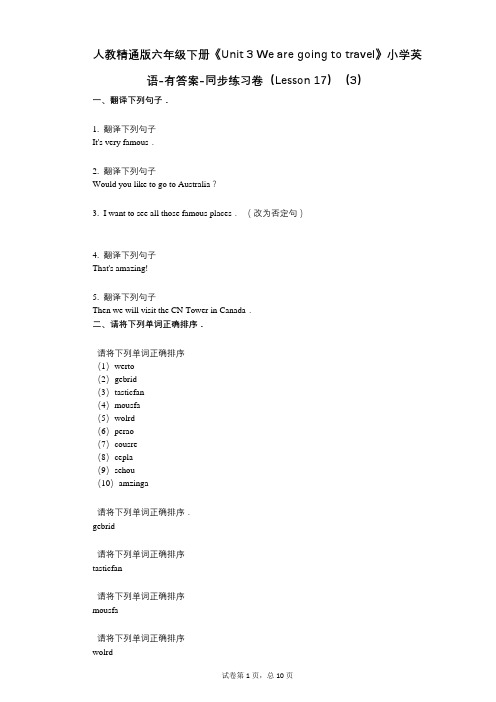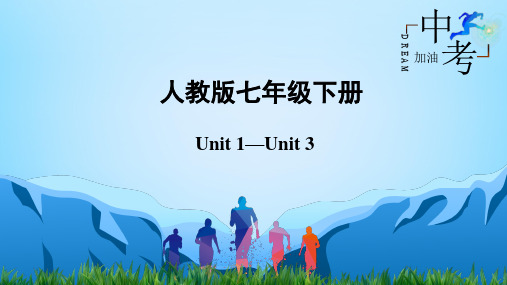Bridge (3)
- 格式:ppt
- 大小:161.00 KB
- 文档页数:18

Unit 6 Topic 3Section A 短语熟记1. near here在附近2. go/ walk up ... 沿着……(向上)走go/ walk down 沿着……(向下)走go/ walk along 沿着……走3. to the end到尽头at the end of ... 在……的尽头in the end 最后;终于4. on the left在左边on your left 在你左边= on the left of you along on the left 在左前方twenty meters along on the left左前方20米5. on the right 在右边on your right 在你右边= on the right of you 6. get to sw. 到达某地= arrive in/ at … = reachget home/ here/ there 到家/到这儿/到那儿7. turn right 向右转= turn to the rightturn left 向左转= turn to the left8. at the first crossing 在第一个十字路口9. the way to...去某地的路10. go across ... = cross ... 横穿过(the road/ bridge公路/桥)11. across from在……的对面12. on the corner of ... 在……拐角处on Zhongshan Road 在中山路13. between ... and ... 在……之间Ⅰ. 词汇。
A. 根据汉语提示完成词汇。
1. Walk ________(沿着) Xinhua Road to the end.2. Go ________(横过) the ________(桥).3. Go along this road, ________(转弯) right at the second ________(十字路口).4. It is about 100 ________(米) along on the right.5. Our school is ________(在……之间) the post office and Xinhua Bookstore.B. 用所给词汇的适当形式填空。

人教精通版六年级下册《Unit 3 We are going to travel》小学英语-有答案-同步练习卷(Lesson 17)(3)一、翻译下列句子.1. 翻译下列句子It's very famous.________2. 翻译下列句子Would you like to go to Australia?________3. I want to see all those famous places.(改为否定句)________4. 翻译下列句子That's amazing!________5. 翻译下列句子Then we will visit the CN Tower in Canada.________二、请将下列单词正确排序.请将下列单词正确排序(1)werto________(2)gebrid________(3)tasticfan________(4)mousfa________(5)wolrd________(6)perao________(7)cousre________(8)cepla________(9)sehou________(10)amzinga________请将下列单词正确排序.gebrid________请将下列单词正确排序tasticfan________请将下列单词正确排序mousfa________请将下列单词正确排序wolrd________请将下列单词正确排序perao________请将下列单词正确排序cousre________请将下列单词正确排序cepla________请将下列单词正确排序sehou________请将下列单词正确排序amzinga________三、连词成句.by plane to are going Hangzhou we________are where going you to visit this week________I palaces all my to want see favorite________the are we Great Wall this morning going to visit________四、单项选择.He usually ________ shopping with his mother at the weekends.()A.goB.goesC.goingMy dog is fatter than __________.()A.himB.heC.hisTom wants to make a kite,so he needs some paper and ___________.()A.two bottles of glue B.two bottle of glueC.two bottles of gluesThe man _________ big eyes is Su Hai's father.()A.withB.inC.onDavid __________ a sports meeting tomorrow.()A.takes part inB.took part inC.is going to take part in五、阅读理解.Mr Smith teaches English in a middle school. He gets up early every day. He has breakfast at seven in the morning. Then he goes to school. He works very hard. He likes playing ping﹣pong with his students. He often goes home at half past five in the afternoon. He has supper at six thirty. After that, he does his work in the study. He has a little white dog. It's lovely. He always plays with it in the evening. He lives happily.根据短文内容,选择正确答案.(1)Mr. Smith is a________.A. in the studyB. in the gardenC. in the kitchen.参考答案与试题解析人教精通版六年级下册《Unit 3 We are going to travel》小学英语-有答案-同步练习卷(Lesson 17)(3)一、翻译下列句子.1.【答案】它是非常有名的.【考点】英译汉【解析】它是非常有名的.【解答】考查英译汉.分析英语句子,It's 它是,very 非常,famous有名的,本句是陈述句,结合整句及汉语表达习惯,据此本句翻译为:它是非常有名的.故答案为:它是非常有名的.2.【答案】你想去澳大利亚吗?【考点】英译汉【解析】你想去澳大利亚吗?【解答】考查英译汉.分析英语句子,本句是一般疑问句,Would you like你想…吗,to不定式符号不翻译, go to 去…,Australia澳大利亚,句末加问号,结合整句及汉语表达习惯,据此本句翻译为:你想去澳大利亚吗?故答案为:你想去澳大利亚吗?3.【答案】I don't want to see all those famous places.【考点】肯定句转否定句【解析】我想去看所有著名的景点.我不想看所有著名的景点.【解答】本题考查肯定句转否定句.根据句子"I want to see all those famous places我想去看所有著名的景点"可知句子是在陈述事实,是一般现在时,否定形式是"don't+动词原形",故答案为:I don't want to see all those famous places.4.【答案】那是令人惊奇的!英译汉【解析】那是令人惊奇的!【解答】考查英译汉.分析英语句子,That's是That is"那是"的缩写, amazing令人惊奇的,本句是陈述句,结合整句及汉语表达习惯,据此本句翻译为:那是令人惊奇的!故答案为:那是令人惊奇的!5.【答案】然后我们将参观加拿大的国家电视塔.【考点】英译汉【解析】然后我们将参观加拿大的国家电视塔.【解答】考查英译汉.分析英语句子,Then然后,we我们,will 将,visit参观, the CN Tower in Canada加拿大的国家电视塔.本句是一般将来时的陈述句,结合整句及汉语表达习惯,据此本句翻译为:然后我们将参观加拿大的国家电视塔.故答案为:然后我们将参观加拿大的国家电视塔.二、请将下列单词正确排序.【答案】tower,bridge,fantastic,famous,world,opera,course,place,house,amazing【考点】单词、词组【解析】(1)tower塔(2)bridge桥(3)fantastic极好的(4)famous出名的(5)world世界(6)opera歌剧(7)course过程(8)place地方(9)house房子(10)amazing令人惊奇的【解答】考查单词拼写.(1)tower.由题知单词为tower(塔),故答案为:tower.(2)bridge.由题知单词为bridge(桥),故答案为:bridge.(3)fantastic.由题知单词为fantastic(极好的),故答案为:fantastic.(4)famous.由题知单词为famous(出名的),故答案为:famous、(5)world.由题知单词为world(世界),故答案为:world.(6)opera.由题知单词为opera(歌剧),故答案为:opera.(7)course.由题知单词为course(过程).故答案为:course.(8)place.由题知单词为place(地方),故答案为:place.(9)house.由题知单词为house(房子).故答案为:house.(10)amazing.由题知单词为amazing(令人惊奇的).故答案为:amazing.【答案】bridge【考点】单词、词组bridge,桥.【解答】考查单词拼写,根据题干所给字母组成单词bridge,译为:桥.故填:bridge.【答案】fantastic【考点】单词、词组【解析】神奇的,很棒的【解答】考查单词拼写.题干字母可以组成单词fantastic,译为:神奇的,很棒的.故填:fantastic.【答案】famous【考点】单词、词组【解析】有名的【解答】考查单词拼写.题干字母可以组成单词famous,译为:有名的.故填:famous.【答案】world【考点】单词、词组【解析】世界【解答】考查单词拼写.题干字母可以组成单词world,译为:世界.故填:world.【答案】opera【考点】单词、词组【解析】戏剧【解答】考查单词拼写.题干字母可以组成单词opera,译为:戏剧.故填:opera.【答案】course【考点】【解析】course【解答】考查单词拼写.题干字母可以组成单词course,译为:课程.故填:course.【答案】place【考点】单词、词组【解析】地方【解答】考查单词拼写.题干字母可以组成单词place,译为:地方.故填:place.【答案】house【考点】单词、词组【解析】house房子【解答】本题主要考查单词拼写.观察题干中的英文字母,可知单词拼写为:house,意思为:房子.故填:house.【答案】amazing【考点】单词、词组【解析】amazing令人惊讶的【解答】本题主要考查单词拼写.观察题干中的英文字母,可知单词可以拼写为:amazing,意思为:令人惊奇的.故填:amazing.三、连词成句.【答案】We are going to Hangzhou by plane.【考点】连词成句【解析】我们打算乘坐飞机去杭州.【解答】本题主要考查句法结构连词成句.观察题干,可知we意思为:我们,做主语;其后接are going to,意思为:准备,说明句子时态是一般将来时;再接地址Hangzhou,by plane意思为:坐飞机,用在句末.结合要求完成句子.故答案为:We are going to Hangzhou by plane.【答案】Where are you going to visit this week?【考点】连词成句【解析】这周你打算去参观哪里?【解答】本题主要考查句法结构连词成句.观察题干,可知where意思为:哪里,用来提问,置于句首;其后接are,意思为:是,are going to意思为:准备,说明句子时态是一般将来时;主语you用在are之后;visit意思为:参观,用在be going to之后;this week 意思为:这周.结合要求完成句子.故答案为:Where are you going to visit this week?【答案】I want to see all my favorite palaces.【考点】连词成句【解析】我想看到所有我最喜爱的宫殿.【解答】本题主要考查句法结构,连词成句.观察题干,可知I意思为:我,做主语,其后接want;want to do something意思为:想要做某事;do用see代替,意思为:看到;all my favorite places意思为:所有我最喜爱的宫殿.结合要求完成句子.故答案为:I want to see all my favorite palaces.【答案】We are going to visit the Great Wall this morning.【考点】连词成句【解析】今天早上我们打算去参观长城.【解答】本题主要考查句法结构连词成句.观察题干,可知we意思为:我们,做主语,其后接be动词are;are going to意思为:将要,说明句子是一般将来时;visit意思为:参观;the Great Wall意思为:长城;this morning意思为:今天早上,是时间,用在句末.结合要求完成句子.故答案为:We are going to visit the Great Wall this morning.四、单项选择.【答案】B【考点】一般现在时,动词单数第三人称【解析】他通常周末和母亲一起去购物.【解答】该题考查动词第三人称单数.根据"usually"可知,句子强调一般事实,时态为一般现在时,主语是第三人称单数,故谓语动词要变为单三形式goes.故选:B.【答案】C【考点】物主代词【解析】我的狗比他的(狗)胖.【解答】考查名词性物主代词.句子表示"我的狗比他的(狗)胖."空格处意为"他的狗",用名词性物主代词his表示.故选:C.【答案】A【考点】不可数名词【解析】汤姆想做一个风筝,所以他需要一些纸和两瓶胶水.【解答】该题考查不可数名词的用法;题干中的glue是不可数名词,应用"数词+量词+of+名词"的结构;数词two为复数,名词glue为不可数名词,量词用复数bottles.故选:A.【答案】A【考点】介词【解析】大眼睛里的那个人是苏海的父亲.【解答】该题考查介词辨析.with和,携带;in在…里面,携带;on在…上面;with表伴随、随身携带;in表示身上的穿戴;句意表示"伴随"的意思,用with.故选:A.【答案】C【考点】一般将来时【解析】戴维明天将要参加一场运动会.【解答】考查一般将来时.根据tomorrow可知句子时态是一般将来时,句意为:戴维明天将要参加一场运动会.主语戴维是单三形式,因而be动词为is,参加是take part in.A选项takes是单三形式.B选项took是过去式.C选项是一般将来时.故选:C.五、阅读理解.【答案】A【考点】文中细节【解析】Smith先生在一所中学教英语.他每天起床很早.他在早上的七点吃早饭.然后他去学校.他工作非常努力.他喜欢和他的学生打乒乓球.他经常在下午五点半回家.他六点半吃晚饭.在那之后,他在书房完成他的工作.他有一只小白狗.它很可爱.他总是和它在晚上玩.他生活得很快乐.【解答】考查对于文中细节的理解.(1)B.由文中Mr Smith teaches English in a middle school.可知Smith先生是一名老师.故选:B.(2)A.由文中He has breakfast at seven in the morning.可知他是在七点吃早饭.故选:A.(3)C.由文中He likes playing ping﹣pong with his students.可知他喜欢和学生们打乒乓球,乒乓球又可以翻译为table tennis.故选:C.(4)B.由文中He has a little white dog.可知他的狗是白色的.故选:B.(5)A.由文中After that,he does his work in the study.可知他是在书房完成工作.故选:A.。

三年级下册英语单词表——一年级起点(外研社版)Module 1在那里there友好的,亲切的nice许多的,大量的lots of总是,一直always早餐breakfast稍微,有点儿 a bit吃早餐have breakfast 羞怯的,胆怯的shy茶;茶叶tea电子贺卡e-card(下午的)茶会tea party文静的quiet另一个,再一个another Module 4(宾格)他him采,摘(花、水果)pick鹦鹉parrot十四fourteen二十twenty十六sixteen肯帮忙的;有用的helpful十八eighteen数学;数学课maths十三thirteen加;加上plus十五fifteen更多的;另外的more十七seventeen十九nineteen Module 2担心的afraid关于about感觉;觉得feel河river好,行all right宽的,宽阔的wide年代久的,古老的old Module 5钟,时钟clock明天tomorrow轮子wheel星期一Monday圆形的;球形的round为什么why将,将会will为什么不呢?Why not?你将you'll=you will星期二Tuesday塔tower星期三Wednesday桥bridge星期四Thursday下一个的;其次的nextModule 3周,星期week将不won't=will not农村,乡下countryside农民;农场主farmerModule 6Module 9跺脚,用力踩stamp是(are的过去式)were计算机,电脑computer年轻的young该,要shall漂亮的,美丽的beautiful胳膊arm是(is的过去式)was也,还alsoModule 7那时then班级class谁who一些,若干;任何一个any(外)祖父;(外)祖母grandparent问;询问;打听ask老的,年老的old问题question昨天yesterday四十forty不是weren't=were not 因此so不是wasn't=was not 大约about有趣的事fun三十thirtyModule 10Module 8第二second努力地hard层floor懒惰的,懒散的lazy担忧的worried母亲;父亲parent发现,找到find家长日Parent's Day第一first谈话;说speak记起,回想起remember对于with母亲节Mother's Day 很,非常quite蔬菜vegetable擅长good at上一个last英语;英语课English体育;体育课PE=physical education汉语,中文;语文课Chinese美术;艺术;美术课art成绩报告单report尝试,试图try。


水清清制作整理Clear water production arrangement1水清清制作整理Clear water production arrangement2水清清制作整理Clear water production arrangement3水清清制作整理Clear water production arrangement4水清清制作整理Clear water production arrangement5水清清制作整理Clear water production arrangement6水清清制作整理Clear water production arrangement7水清清制作整理Clear water production arrangement8水清清制作整理Clear water production arrangement9水清清制作整理Clear water production arrangement10水清清制作整理Clear water production arrangement11水清清制作整理Clear water production arrangement12《英语(Go for it!)》七年级下册单词表(表格型/带音标)水清清制作整理Clear water production arrangement13水清清制作整理Clear water production arrangement14水清清制作整理Clear water production arrangement15水清清制作整理Clear water production arrangement16《英语(Go for it!)》七年级下册单词表(表格型/带音标)水清清制作整理Clear water production arrangement17水清清制作整理Clear water production arrangement18水清清制作整理Clear water production arrangement19水清清制作整理Clear water production arrangement20水清清制作整理Clear water production arrangement21水清清制作整理Clear water production arrangement22水清清制作整理Clear water production arrangement23水清清制作整理Clear water production arrangement24水清清制作整理Clear water production arrangement25《英语(Go for it!)》七年级下册单词表(表格型/带音标)水清清制作整理Clear water production arrangement26水清清制作整理Clear water production arrangement27水清清制作整理Clear water production arrangement28。

小学上册英语第3单元测验卷(有答案)英语试题一、综合题(本题有100小题,每小题1分,共100分.每小题不选、错误,均不给分)1.The first person to swim across the English Channel was ______ (马修·温斯顿).2.The __________ (历史的情感连接) bridge gaps.3.The first Olympic champion was _______. (科罗比乌斯)4.The melting point of ice is _______ degrees Celsius.5.An element's reactivity depends on the arrangement of its _____ (electrons).6. A ________ (金鱼) swims gracefully in its bowl.7. (African) kingdoms were rich in resources and trade. The ____8. A chemical reaction can lead to a change in ______ state.9.The ______ is a skilled poet.10.We have a ______ (快乐的) gathering for special occasions.11.The ________ has a long tail and likes to climb.12.What is the name of the famous American holiday celebrated on the fourth Thursday in November?A. ChristmasB. ThanksgivingC. New Year's DayD. Independence Day答案:B13.The first successful flight of a powered aircraft was in _______.14.What is the name of the famous detective created by Arthur Conan Doyle?A. Hercule PoirotB. Sam SpadeC. Sherlock HolmesD. Philip Marlowe答案:C15.The process of neutralization results in the formation of ______.16.The chemical symbol for aluminum is ______.17. A _____ (盆栽) can be placed indoors.18.What is the name of the famous statue in New York Harbor?A. Christ the RedeemerB. Statue of LibertyC. DavidD. The Thinker 答案: B19.My family celebrates ______ together. (我的家人一起庆祝______。
第1篇一、基础知识与技能问题1. 简要介绍下网络管理的主要任务和职责。
解析:网络管理的主要任务包括网络监控、故障排除、性能优化、安全防护、用户支持等。
职责包括确保网络的稳定运行、提高网络性能、保障网络安全、满足用户需求等。
2. 什么是IP地址?IPv4和IPv6有何区别?解析:IP地址是互联网协议地址的简称,用于标识网络中的设备。
IPv4地址采用32位表示,由4个8位数字组成,例如192.168.1.1。
IPv6地址采用128位表示,由8组16进制数字组成,例如2001:0db8:85a3:0000:0000:8a2e:0370:7334。
IPv6与IPv4的主要区别在于地址空间更大、安全性更高、更易于配置和管理。
3. 你对网络安全有什么了解?列举几种常见的网络攻击类型。
解析:网络安全是指保护网络系统不受未经授权的访问、攻击、破坏和泄露。
常见的网络攻击类型包括:拒绝服务攻击(DoS)、分布式拒绝服务攻击(DDoS)、中间人攻击(MITM)、病毒攻击、木马攻击、网络钓鱼、SQL注入等。
4. 请解释什么是防火墙,以及它的作用是什么?解析:防火墙是一种网络安全设备,用于监控和控制进出网络的流量。
防火墙的作用包括:过滤非法流量、阻止恶意攻击、保护内部网络安全、记录网络流量日志等。
5. 什么是LAN和WAN?这两者之间有何区别?解析:LAN(局域网)是指在一个较小的地理范围内(如一个建筑物或一个校园)连接的计算机和网络设备。
WAN(广域网)是指跨越较大地理范围(如城市、国家甚至全球)的计算机网络。
LAN和WAN的主要区别在于覆盖范围、传输速率、成本和复杂性。
二、网络安全问题1. 请列举几种常见的网络安全威胁,并提供相应的解决方案。
解析:常见的网络安全威胁包括:病毒、木马、恶意软件、钓鱼攻击、DDoS攻击等。
解决方案包括:安装防病毒软件、定期更新操作系统和软件、使用安全的网络连接、加强用户安全教育等。
2. 如何保护公司内部网络免受外部攻击?解析:保护公司内部网络免受外部攻击的措施包括:设置防火墙规则、限制外部访问、使用VPN技术、定期进行安全检查、培训员工网络安全意识等。
课课练六年级上册答案英语译林版《课课练六年级上册答案英语译林版》是一本针对小学六年级学生编写的英语练习册,旨在帮助学生提高英语听、说、读、写能力。
下面按照章节内容给出答案列表。
单元一:My School Life1.词汇练习A.1. shoes; 2. lesson; 3. blackboard; 4. basketball; 5. classroomB.1. play; 2. library; 3. learn; 4. swim; 6. teachC.1. science; 2. delicious; 3. P.E.; 4. friendly; 5. different2.语法练习A.1. can; 2. would; 3. will; 4. should; 5. mustB.1. How often; 2. What time; 3. Where; 4. What class; 5. Why3.阅读练习A.1. They are writing a story.B. Mike likes English and sports. He doesn’t like mat h.C. She has music and art on Tuesday.单元二:My City1.词汇练习A.1. factory; 2. bridge; 3. river; 4. market; 5. parkB.1. museum; 2. factory; 3. supermarket; 4. theatre; 5. libraryC.1. capital; 2. ancient; 3. crowded; 4. polluted; 5. famous2.语法练习A.1. how; 2. how many; 3. how much; 4. how far; 5. how longB.1. in; 2. on; 3. at; 4. at; 5. in3.阅读练习A.1. They are going to the zoo.B. The library is near the museum.C. The festival is on Friday.单元三:Hobbies1.词汇练习A.1. guitar; 2. swimming; 3. painting; 4. reading; 5. dancingB.1. computer games; 2. fishing; 3. basketball; 4. painting; 5. singingC.1. popular; 2. interesting; 3. exciting; 4. difficult; 5. relaxing2.语法练习A.1. have; 2. has; 3. do; 4. does; 5. don’tB.1. What; 2. Who; 3. Why; 4. When; 5. How3.阅读练习A.1. He is playing soccer.B. Jane likes playing the piano.C. They are going to the park.单元四:Nature and Environment1.词汇练习A.1. butterfly; 2. forest; 3. lake; 4. pollution; 5. skyB.1. desert; 2. hill; 3. island; 4. ocean; 5. waterfallC.1. clean; 2. natural; 3. beautiful; 4. endangered; 5. fresh2.语法练习A.1. was; 2. were; 3. is; 4. are; 5. amB.1. Have; 2. Has; 3. Are; 4. Do; 5. Does3.阅读练习A.1. They are cleaning the beach.B. The water is dirty.C. The flowers are beautiful.单元五:Festivals1.词汇练习A.1. fireworks; 2. lantern; 3. temple; 4. tradition; 5. dragonB.1. Christmas; 2. Easter; 3. Halloween; 4. New Year; 5. ThanksgivingC.1. celebrate; 2. exciting; 3. colorful; 4. traditional; 5. religious2.语法练习A.1. are; 2. is; 3. am; 4. do; 5. doesB.1. What; 2. When; 3. Where; 4. Why; 5. How3.阅读练习A.1. They are eating mooncakes.B. The Mid-Autumn Festival is in September.C. He is going to the Lantern Festival tonight.单元六:Travelling1.词汇练习A.1. bus; 2. train; 3. hotel; 4. ticket; 5. airportB.1. bike; 2. boat; 3. car; 4. plane; 5. subwayC.1. busy; 2. difficult; 3. expensive; 4. modern; 5. comfortable2.语法练习A.1. go; 2. takes; 3. takes; 4. takes; 5. goB.1. which; 2. where; 3. when; 4. how long; 5. how3.阅读练习A.1. They are taking the subway.B. The train is late.C. The hotel is big and clean.以上是《课课练六年级上册答案英语译林版》的答案列表,希望能对小学生学习英语有所帮助。
Module2 模块测试卷一、单词辨音(判断每组单词画线部分的读音,相同的打“√”,不同的打“×”)。
( ) 1. house mouth ( ) 2. wide big( ) 3. London long ( ) 4. eye my( ) 5. river tower ( ) 6. see tree( ) 7. park star ( ) 8. red friend( ) 9. can favourite ( ) 10. small tall二、选出每组词中不同种类的单词。
( ) 1. A. six B. eye C. nine( ) 2. A. long B. tall C. bridge( ) 3. A. will B. new C. old( ) 4. A. park B. school C. river( ) 5. A. red B. sky C. blue( ) 6. A. book B. wheel C. pen( ) 7. A. one B. this C. that( ) 8. A. like B. make C. small( ) 9. A. his B. at C. my( ) 10. A. London B. Parrot C. China三、单项选择。
( ) 1. —Do you know Big Ben is ________ very old clock?—Yes, it is.A. aB. an( ) 2. London is a beautiful city. I ________ it.A. want visitB. want to visit( ) 3. You can see ________ in London if you go there.A. Tower BridgeB. tower bridge( ) 4. Look at this book. It’s ________ Yaoming.A. fromB. about( ) 5. This house is big, ________ that one is small.A. butB. or( ) 6. The River Thames is very long and ________.A. longB. wide四、英汉互译(从B栏中选出A栏句子的正确译文)。
Unit 3 How do you get to school? 同步测试题B. 词汇。
(5分)根据句意及所给汉语提示写单词,补全句子。
(5分)1. They lives in the small ________ (村庄) .2. —What’s that over there?—It’s a ________ (桥).3. You can see two ________ (小船) in the picture.4. He ________ (离开) the library at 5:00 pm.5. She looks ________ (像) her mother.同步语法按括号内的要求,进行句型转换。
每空一词。
(10分)1. They take the train to school. (对划线部分提问)________ do they ________ to school?2. It takes about 20 minutes to go there by bus. (对划线部分提问)________ ________ does it ________ to go there by bus?3. It is 5 kilometers from my home to school. (对划线部分提问)________ ________ is it from ________ home to school?4. They go to work by subway. (改为同义句)They usually ________ ________ ________ to work.5. The boys go to the zoo by bike. (改为同义句)The boys ________ ________ ________ to the zoo.课本要点A. 单项选择。
(15分)( ) 1. The pencil is old, I need a ________ one.A. longB. shortC. newD. green( ) 2. Forty and sixty is ________.A. ninetyB. eightyC. seventyD. one hundred( ) 3. It’s about ________ walk from my home to school.A. ten minutesB. ten minuteC. ten minute’sD. ten minutes’( ) 4. Taotao is ________ boy.A. a 11-year-oldB. an 11-year-oldC. a 11 years oldD. an 11 year old( ) 5. —Thank you so much for helping me.—________.A. You’re welcomeB. Don’t say soC. That’s rightD. All right( ) 6. There is no ________ and they have to cross the river by boat.A. busB. trainC. bridgeD. subway( ) 7. It takes me fifteen minutes ________ from my home to the bus station.A. walkB. walkingC. to walkD. walks ( ) 8. I think her dream of being a doctor can ________.A. go backB. come trueC. come onD. go to( ) 9. It’s difficult for you ________ to the station in a short time.A. on bikesB. by bikeC. take bikesD. to ride a bike( ) 10. I don’t know ________. Can you tell me?A. where Mr Smith livesB. where does Mr Smith liveC. Mr Smith lives whereD. does Mr Smith live where( ) 11. David lives near a ________. He can go swimming there.A. stopB. riverC. villageD. library( ) 12. I think they can ________ there. It’s a little far.A. by busB. take a busC. on foot C. walk( ) 13. —________ the transportation in your city?—It’s quite good, I think.A. How do you takeB. Is it easy to takeC. What do you think ofD. How fast is( ) 14. We can see a ball ________ the two boxes.A. betweenB. inC. withD. for( ) 15. —I take the subway to school. ________?—Well, I take a bus.A. How are youB. What do you doC. Where are youD. What about youB. 根据汉语意思,完成英语句子。